- Category
- War in Ukraine
A Night with the Medics Holding Ukraine’s Frontline Together
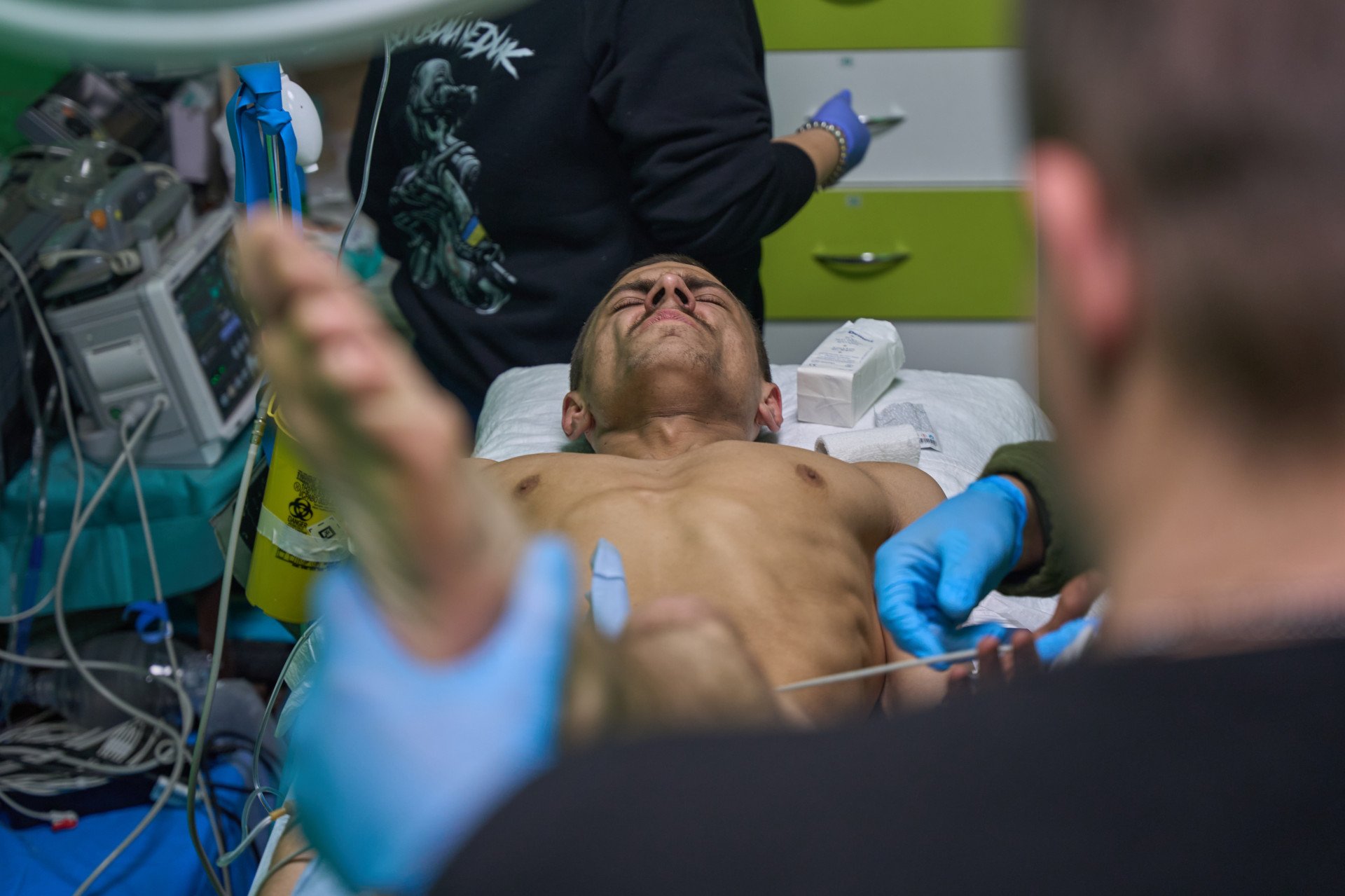
In a frontline field hospital, medics work through the night, racing to stabilize soldiers wounded in relentless Russian assaults. The flow of wounded never stops—each life hanging in the balance, each decision a matter of seconds. UNITED24 Media spent the night inside, documenting the medics’ tireless fight to keep soldiers alive as war rages around them.
They say there are no atheists in foxholes—but among those who hold the wounded together, faith may take a different form. It isn’t in God, but in each other, in the belief that saving even one life still matters, even when death is all around.
Racing towards the unknown
“Now we have an air raid, we are expecting missiles…we need to be fast.”
Rita, from Ukraine’s 3rd Assault Brigade, warns us as we speed down a muddy track parallel to an already blown-out bridge. Our photographer, Mykyta, presses down on the accelerator, our back wheels fishtailing through deep ruts. The winter night sky is black and-so far-empty.
She is leading us to the stabilization point, the first stop for wounded soldiers coming off the front lines. Her fingers move quickly over her phone as she checks in with her team.
“There have been a lot of strikes lately.”
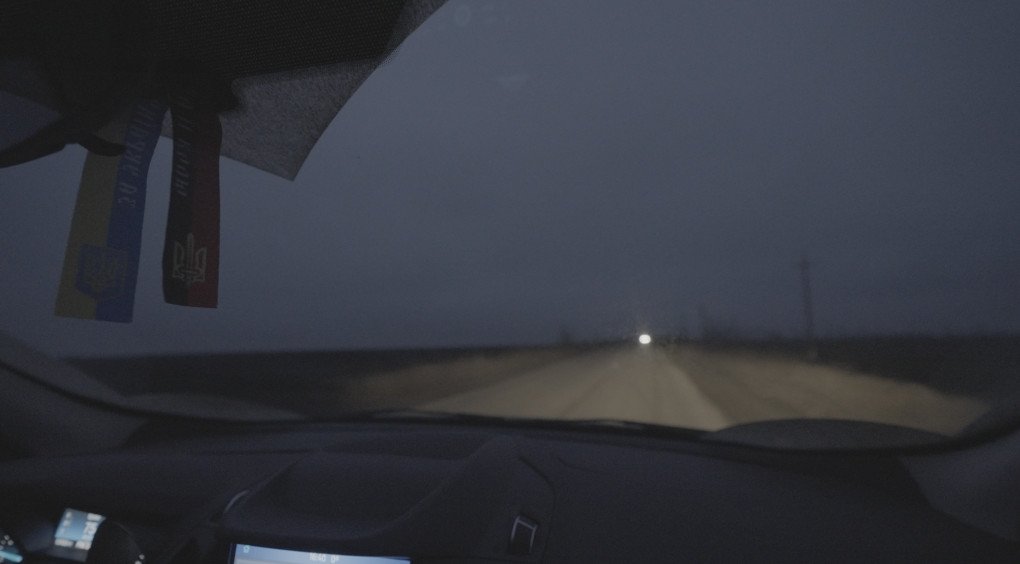
Before the war, she was a film actress, but there is no trace of performance in her expression now. Her high cheekbones and strong jawline are set with tension. She is dressed head to toe in army camo, her tousled blonde hair framing sharp, watchful eyes. Even in her simplicity, she is striking– the kind of woman men fall for slowly, then all at once.
As the car speeds along, we talk about the war—how Ukraine’s youth has stepped up, how Western support has slowed down, and what it really means to fight for one’s country.
Inside the stabilization point
We arrive. As we step out of the car, distant booms ripple through the night– we are closer to the front than I had thought.
“Is that outgoing,” I ask, hopeful.
“No, incoming,” Rita chuckles.
Still, I leave my flak jacket and helmet in the car, defying my own instincts.
Inside, the main room is lined with half a dozen beds, covered with woolen blankets and white medical sheets, ready to absorb blood– or worse. Nurses carry trays of bread with salami to a small alcove. A man fastidiously changes bin liners in the bathrooms.
There is a quiet sense of anticipation– the kind that comes before a long, brutal night.
Disciplined, deadly, undeterred
This stabilization point serves Ukraine’s 3rd Assault Brigade– an elite group of fighters with a reputation for being disciplined, resilient and fairly lethal.
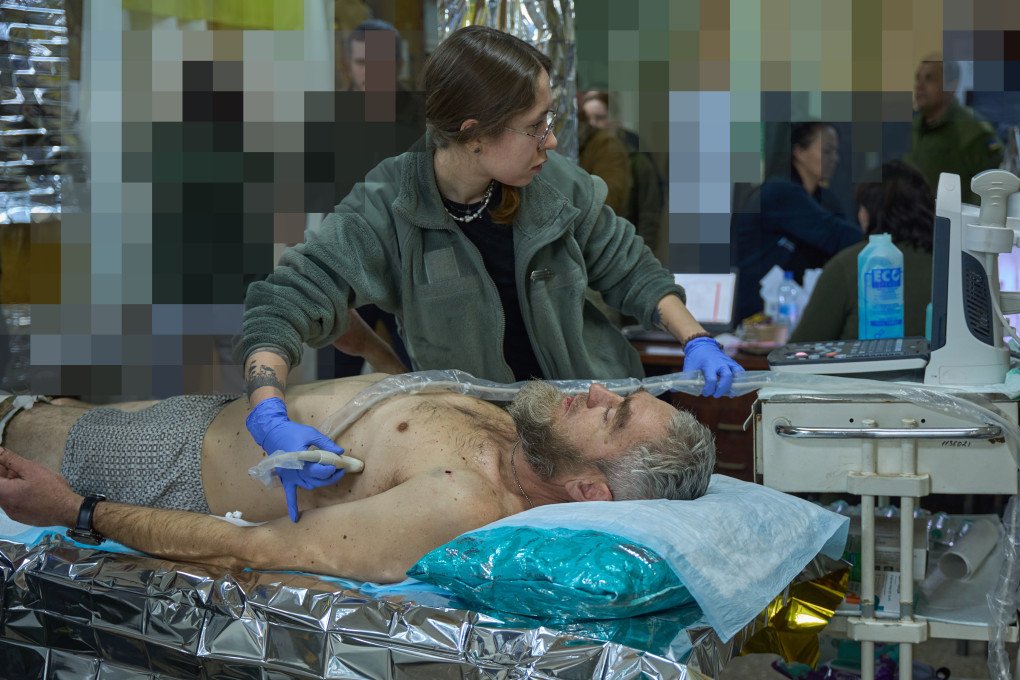
Its roots trace back to the Azov Battalion before it became an independent volunteer force. Through sheer willpower, the brigade is holding a section of the front that would normally require three to four times the manpower. The village where this field hospital sits is under increasing pressure from advancing Russian troops.
Yet, spirits remain high. A doctor hands me a boiling-hot cup of tea in a flimsy plastic cup. I chuckle at the health hazards of carcinogens but quickly realize there are far greater dangers at hand.
Sky: a soldier, a student, a daughter
In one room, a young volunteer known by the callsign “Sky” takes advantage of the quiet to study for her exams. Using Starlink, she stares intently at her phone– for now, her world is elsewhere.
Sky is the daughter of an artillery gunner in Ukraine’s 81st Brigade. Sitting cross-legged with her AK-47 resting against her bed, she looks up from her studies. When I ask her if her father is proud of her, she smiles and says “Yes”.
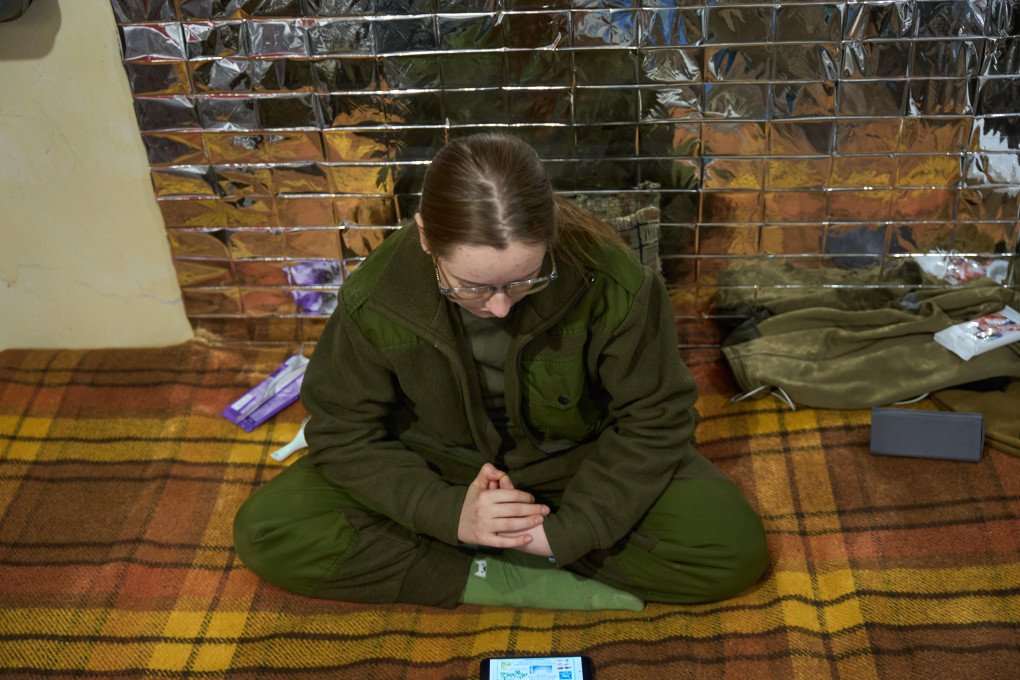
She is just 23 years old. While most women her age are starting their first jobs or going on dates, she is here. And yet, I get the sense that the community she has found here is perhaps something she would have lacked at home. “All of my friends are in the military now,” she says.
In her free time she is working on ways to support Azov POW ’s from Mariupol. As she speaks about their bravery, it feels as though she’s wrapping herself in it—armor, not just for them, but for herself. She recalls a mission last year to evacuate wounded soldiers, known as 300’s in military slang. But when she arrived, there were no wounded left to save—only bodies. Just hours earlier, she had helped those same men prepare for the mission.
“It’s not that I didn’t expect it,” she says, “but it’s traumatizing. Even more traumatizing when you have to take people you know.”
Behind her strength, there is a quiet fragility. The weight of everything she has witnessed lingers in her eyes.
The wounded keep coming
The interview with Sky is cut short by a commotion outside. A stretcher bursts through the door– a man with a leg wrapped in bloodied bandages.
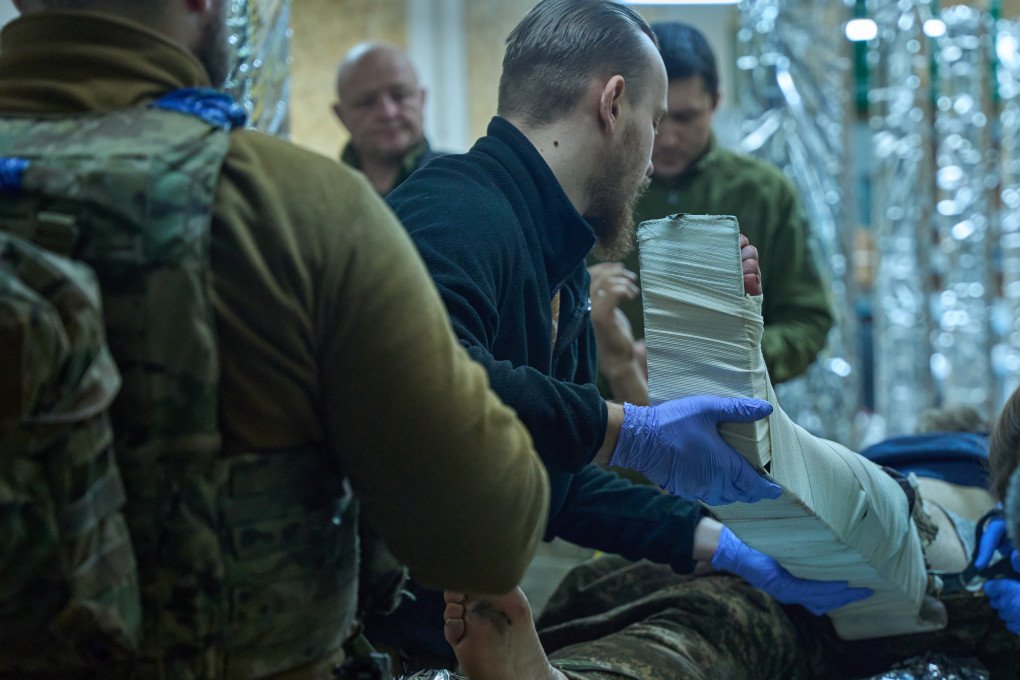
“I changed the bandage— it was filled with blood,” the evac medic reports.
A doctor lifts the soldier’s leg and says, “There’s an injury to the middle upper calf. When did this happen?”
“This morning,” the soldier replies.
“When did you put on the tourniquet?” The patient is whisked away to the ultrasound.
The injured man is 52 years old– much older than most soldiers in the United States. He has a shrapnel wound in his leg and is at risk of hemorrhage.
Luka, a 32-year-old doctor from Lviv, scans the injury. Before the war, he owned several coffee shops. His earring hints at a past far removed from the blue scrubs he is wearing now.
“The best surgery is the one that never happened,” he says. “Like war—the best war is the one that never happened.”
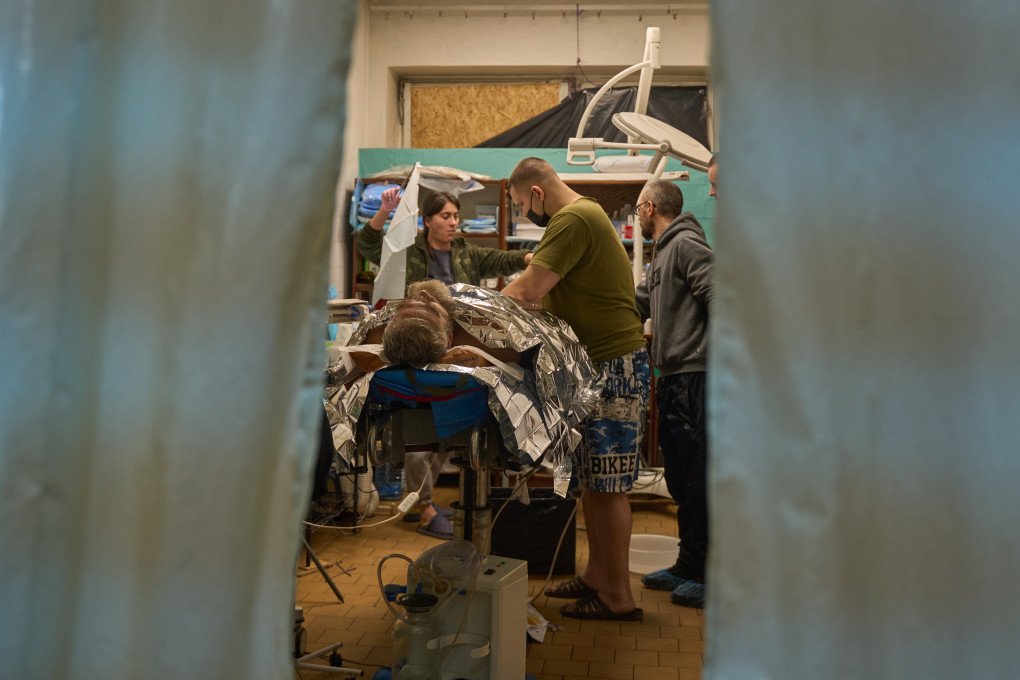
A long night, a harsh reality
More waves of wounded arrive. The luckiest have mild concussions. Others, worse. They strip out of soot-covered uniforms, tossing them into trash bags. They wash the dirt from their faces and change into dark green hospital pajamas. Their head injuries have made them slightly loopy; in another setting, they could be mistaken for drunk.
The doctors and nurses live on a slow drip of coffee, chocolate, and war stories. Around a kitchen table, Rita recounts a soldier who arrived blind and handless. “But really this guy was so strong. It was inspiring,” she says. It is almost too horrific to imagine—waking up in eternal darkness.
“He has a wife,” she adds “It’s really very beautiful…This love.”
Across the table, Luka mutters “For now.”
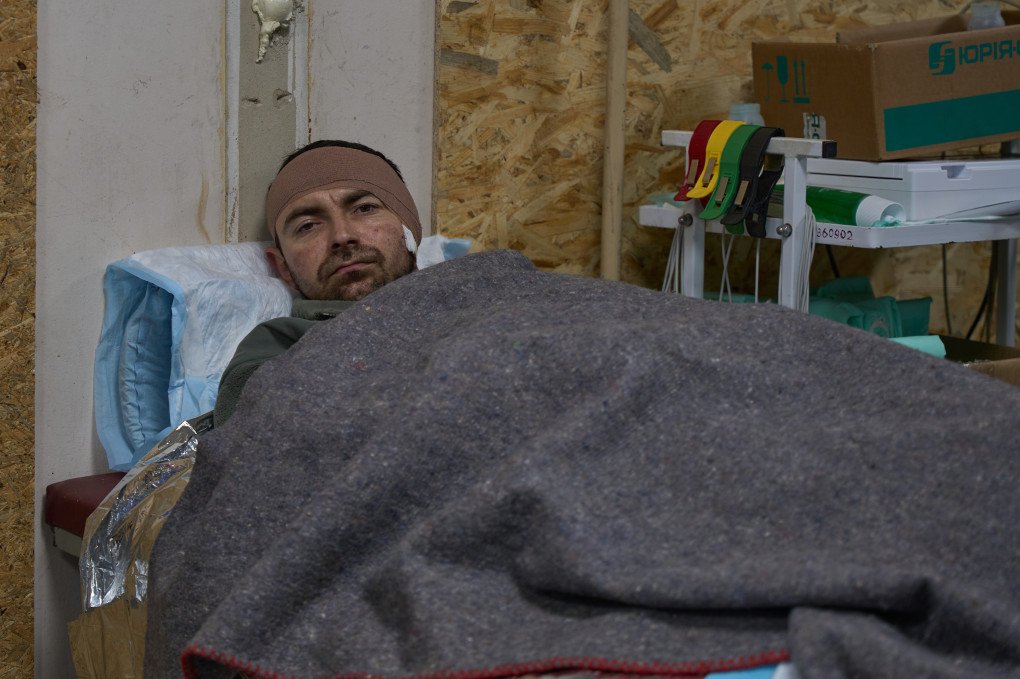
We sit in silence, sipping coffee from the flimsy plastic cups. A few kilometers away, soldiers fight for their country. Here, Rita, Luka, and Sky fight their own war. It’s almost 2:00 am when I step away from the group, desperate for rest and space to absorb everything I’ve seen. I lie across a row of chairs, rocked to sleep by the distant rumble of artillery
At 2:30 am, once again the field hospital doors burst open. A stretcher rattles up the wooden ramp, this time carrying a young soldier, his blackened hand is wrapped in a bloodied bandage.
“Date of birth?” the doctor asks.
“April fourth, two thousand four,” he replies.
His face is gray, eyes wide like saucers. As they unwrap his dressing, his gaze clings to the doctors’ every word. Am I going to lose my right hand? his eyes ask.
Another group of soldiers enters– older, exhausted. They strip off their soot-covered uniforms, moving slowly, wordlessly. They had held their position for days until tonight’s barrage of artillery and incendiary munitions forced them back. One of their guys didn’t make it.
Out behind the building, two soldiers with red flashlights walk toward a pickup truck. Smoke from a cigarette curls behind them. They open the tailgate, revealing a six-foot-long black body bag. They carry it inside, placing it gently in the morgue before retreating quickly, as if death itself is contagious.
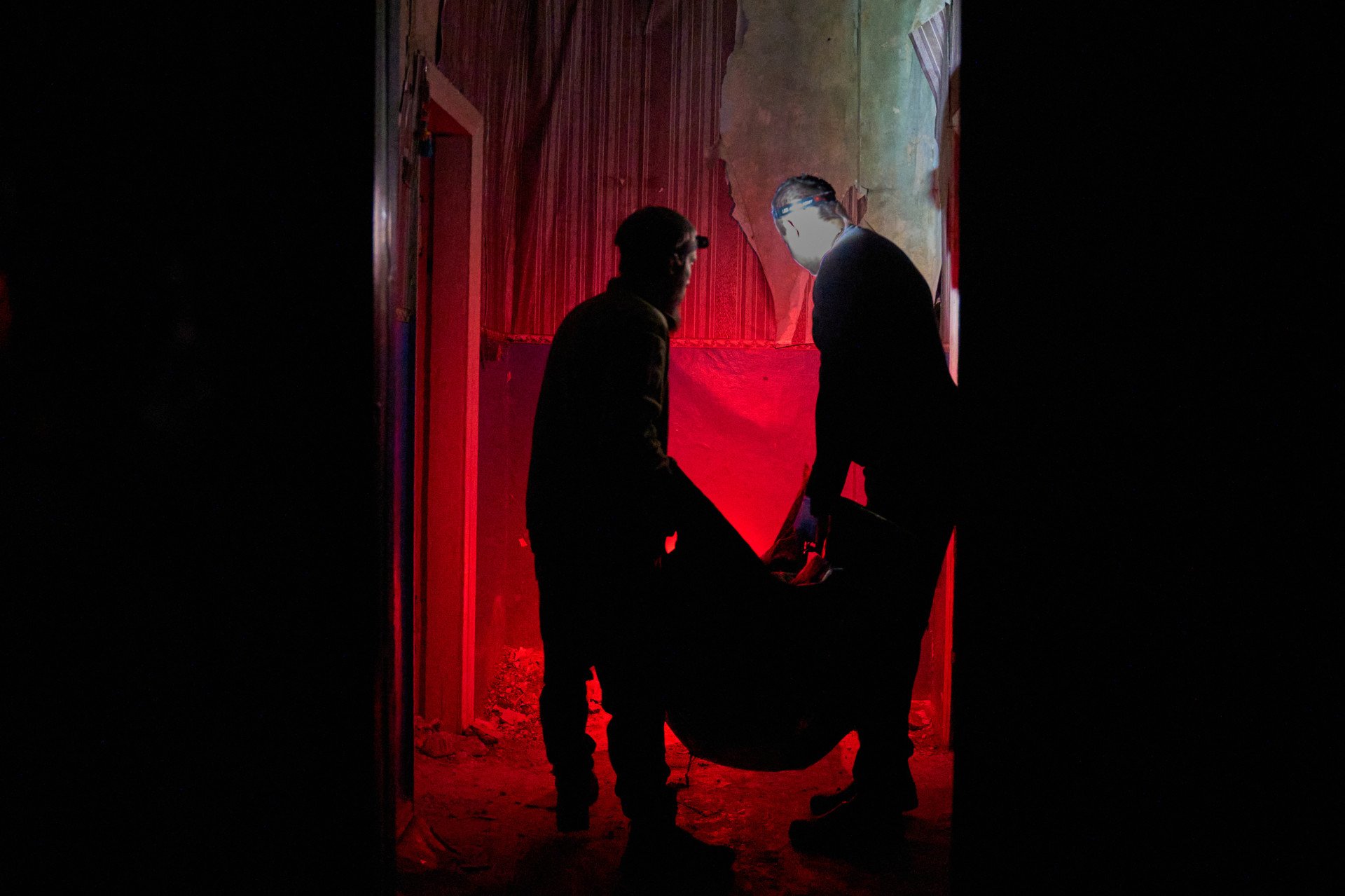
The weight of war on the living
Within half an hour, the hospital beds are full again. The entrance is packed with trash bags sealed with gray duct tape, soldiers’ names scrawled in Cyrillic. One sighs in relief as a nurse drapes a woolen blanket over him.
“Babushka,” he murmurs in a fentanyl daze.
In a corner, the medics who brought the unit huddle together. One of them, Taras– call sign “Rascal”—is 28 years old. His nickname suits him. He looks like a ‘90s action figure, a soldier straight out of G.I. Joe, with a mustache and a patch on his arm depicting a half-naked woman and a man gripping an assault rifle.
“It means you’ve pissed away your youth” he explains with a smirk.
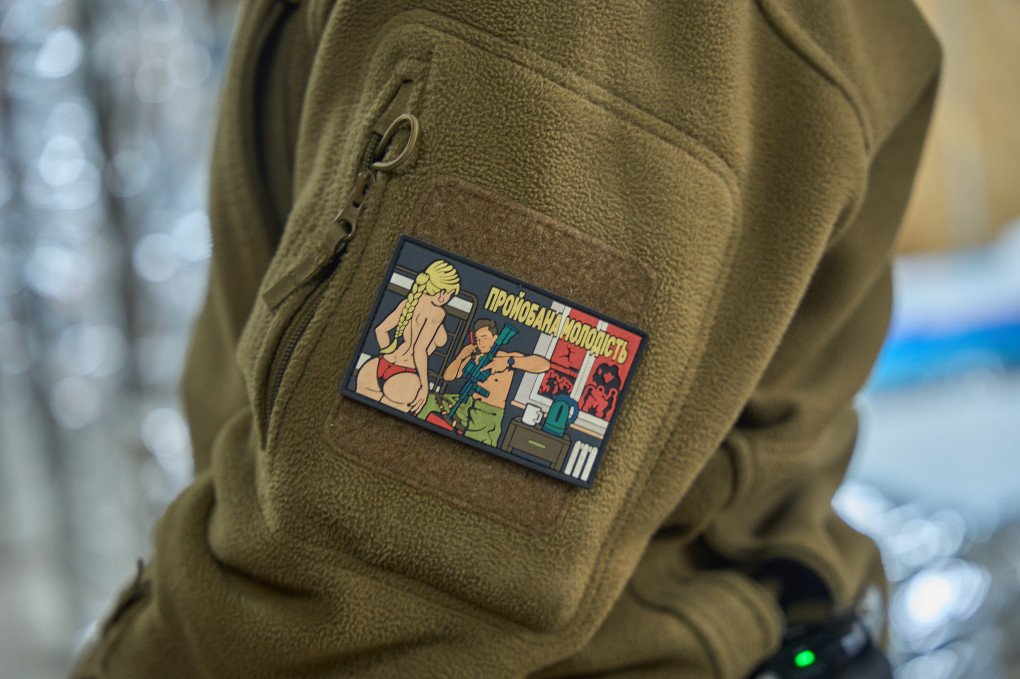
Leaving the battlefield, if only for a moment
Before joining the 3rd Assault Brigade as a medic, Taras was a soldier. “I already had experience that made me familiar with death—I killed, and I rescued. Some people I wasn’t able to rescue.” He shrugs. “It changes every person. But I think it brings people together. Like they say, war turns boys into men.”
Before the war, he worked as a bartender and took part in historical reenactments. Here, survival means shutting off emotions. “The job is keeping people alive,” he says. “When you rescue someone, you don’t really think about it—you just grip onto their life to keep them here.”
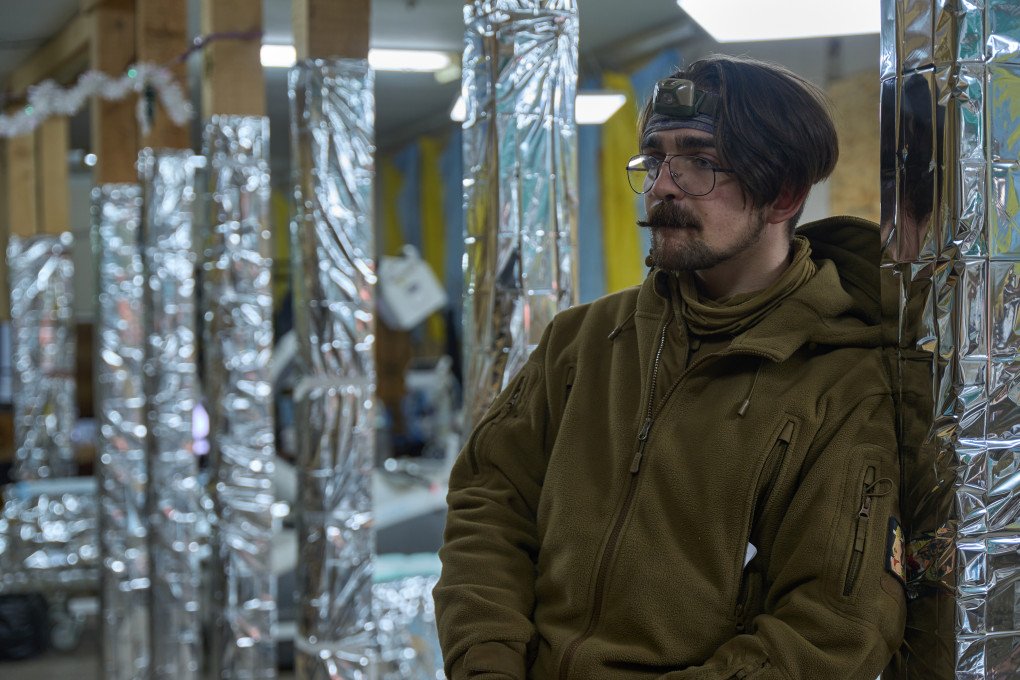
Yet he oscillates between two realities: the hardened senior medic who has been in this war since the first days of the full-scale invasion and the young man still wondering about the life he once imagined.
“I’m 28 years old. What do I want to do?” he says, shaking his head. “I want to drink wine and be with my girl. But no…” He gestures around him. His voice cracks. His eyes well with tears.
Morning comes, but the war continues
At 7 a.m., the sun rises, signaling the end of the hospital’s night shift. We say our farewells and pile back into the car.
Having arrived under the cover of darkness, the morning light now reveals a sobering landscape. The town is all but abandoned. Wooden planks cover almost every window. What isn’t damaged lies in crumbled heaps of cement. A pack of stray dogs barks and plays, blissfully unaware.
“Does anyone still live here?” I ask Rita.
As we speed toward safety, the night begins to slip away into a dream. We stop for fresh air, stepping out into an icy field of sunflowers.
“I hope these are not mined,” Rita jokes.
She turns to me, looking out over the frozen field. “We need to defend our land, to protect our people,” she says. “Right now, I know I’m in the right place, at the right time, with the right people.”
The morning light spreads over the gentle slopes of the countryside, bringing the world back to life. “It gives you energy when you take action,” she says. “You’re not a victim. You can act—not only react. You can act.”
She stops mid-step, taking in the vast, empty fields around us. The only sound is the crunch of dead, icy roots beneath our feet.
“We deserve to live in an independent country,” she says. “Not only our generation but the generations before.” A car honks. She blinks, snapping back to the present.
“I don’t know what tomorrow brings,” she says, “but today we are focused. Today, we fight.”
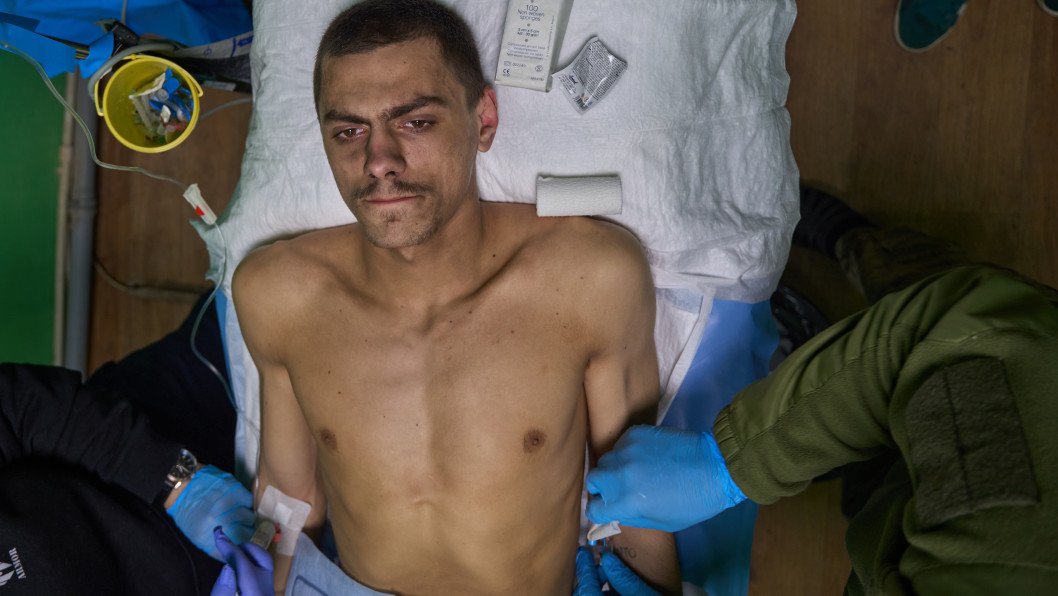
-fca37bf6b0e73483220d55f0816978cf.jpeg)
-35249c104385ca158fb62273fbd31476.jpg)


-554f0711f15a880af68b2550a739eee4.jpg)



-206008aed5f329e86c52788e3e423f23.jpg)